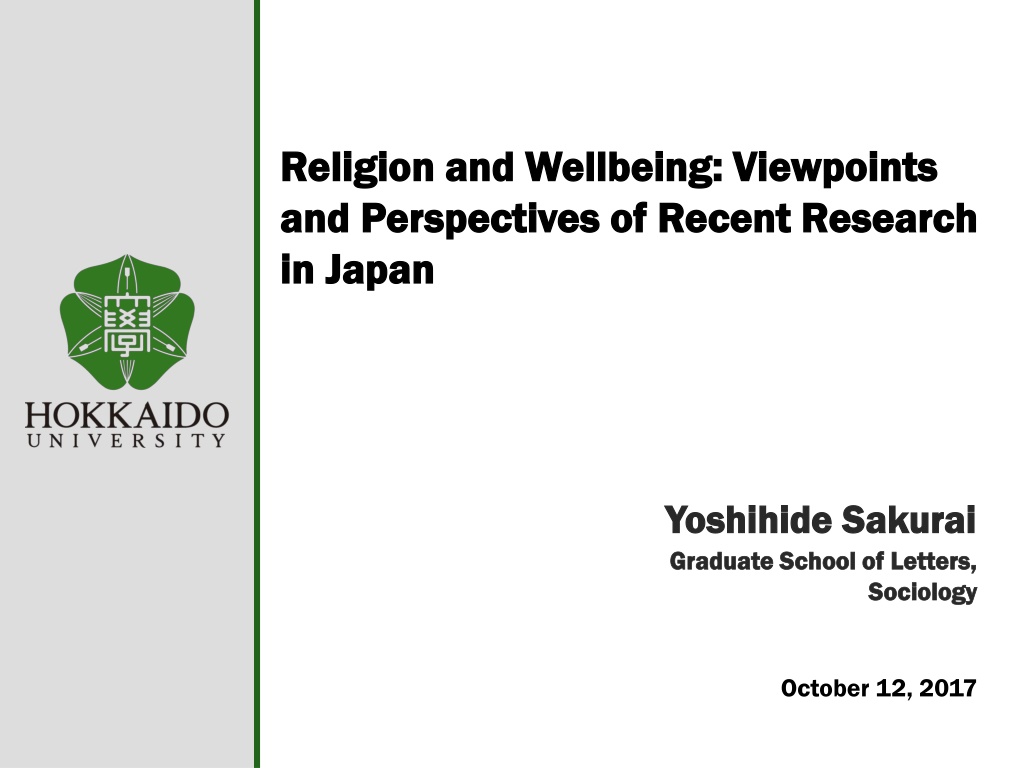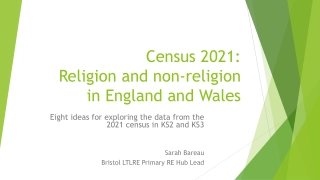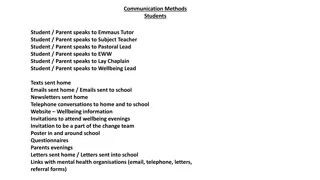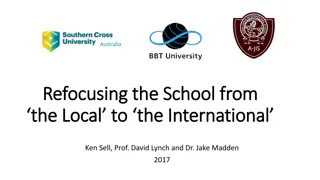Religion and Wellbeing: Recent Research Perspectives in Japan
Exploring the relationship between religion and wellbeing in Japan, this research discusses the impact of religious beliefs on individual and social conditions, as well as national happiness rankings. It delves into the influence of religions on mental health, social capital, and overall life quality, highlighting the ways in which faith-based organizations contribute to enhancing people's life chances through social work.
Download Presentation

Please find below an Image/Link to download the presentation.
The content on the website is provided AS IS for your information and personal use only. It may not be sold, licensed, or shared on other websites without obtaining consent from the author. Download presentation by click this link. If you encounter any issues during the download, it is possible that the publisher has removed the file from their server.
E N D
Presentation Transcript
Religion and Wellbeing: Viewpoints Religion and Wellbeing: Viewpoints and Perspectives of Recent Research and Perspectives of Recent Research in Japan in Japan Yoshihide Yoshihide Sakurai Sakurai Graduate School of Letters, Graduate School of Letters, Sociology Sociology October 12, 2017
1 Outline 1 Well-being in East Asia 2 Review of literatures on well-being and religion 3 Research Data Analysis and results Implications 4 Future research
2 National Average Happiness -WORLD HAPPINESS REPORT 2015-16 Ranking of Happiness Ranking of Happiness 2015 2015 GDP and Happiness GDP and Happiness Switzerland World Ranking 2016 World Ranking 2016 Denmark GDP GDP Happiness Happiness Finland China China 2 2 83 83 Australia Japan Japan 3 3 53 53 United States Korea Korea 11 11 58 58 Belgium Indonesia Indonesia 16 16 79 79 United Kingdom Taiwan Taiwan 22 22 35 35 Singapore Germany Thailand Thailand 27 27 33 33 France Hong Kong Hong Kong 34 34 75 75 Thailand Malaysia Malaysia 35 35 47 47 Japan Singapore Singapore 39 39 22 22 South Korea Philippines Philippines 40 40 82 82 Hong Kong Vetnam Vetnam 50 50 96 96 China Syria Ranking of Happiness World Happiness Report 2016 World Happiness Report 2016 The Earth Institute Columbia University The Earth Institute Columbia University 0 2 4 6 8 Regressions to Explain National Average Happiness: Log GDP per capita, Social support, Healthy life expectancy at birth, Freedom to make life choices, Generosity, Perceptions of corruption
Well-being and individual/social conditions Medical and nursing care Physical Health community Life Mental health and Happiness philosophy Social security and social capital Life attitude Life attitude Social norm and culture Working place
4 Ruut Veenhoven s four qualities of life and religions Outer quality Outer quality Inner quality Inner quality Life chance Livability of environment Utility of life Life-ability of persons Appreciation of life Life result FBO and FRO promote peoples life chance by social work. Religions provide social and spiritual resources. Religions provide mental and social capital in their congregation. Religions provide happiness by their teaching and ritual.
5 Review of papers on SSSR 2001-2015 1 Schnittker, Jason, 2001, When is Faith Enough?: The Effects of Religious Involvement on Depression, JSSR40-3:393-411. 2 Pargament, Kenneth I.2001, et all, Religious Coping Among the Religious: The Relationships Between Religious Coping and Well-Being in a National Sample of Presbyterian Clergy, Elders, and Members, JSSR40- 3:497-513. 29 Jong Hyun Jung, 2015, Sense of Divine Involvement and Sense of Meaning in Life: Religious Tradition as a Contingency, JSSR54-1:119-133. 30 Clemens M. Lechner and Thomas Leopold, 2015, Religious Attendance Buffers the Impact of Unemployment on Life Satisfaction: Longitudinal Evidence from Germany, JSSR54-1:166-174.
6 Findings Methodology is statistical analysis of general social survey. Religious factors such as attendance, belief, and human support in congregation generally have positive effect on subjective well-being. Especially for elders, underclass, and African-American. Coping effect for loss experience such as divorce/bereavement, illness, and unemployment. Chinese religions such as Buddhist and Taoist ritual, fortune telling, and folk karmic dogma have negative effect, and Japanese religions have ambiguous one.
7 Japanese literatures Kaneko ISSP1998 Religion In US positive impact of marriage, class consciousness, religious attitude, and education (in this order) on happiness In Japan class consciousness, marriage, and sex in this order, and no impact by religious belief Kawabata ISSP2008 Religion and happiness are correlated in almost countries In Japan no correlation, however, no unhappy person with religious belief.
8 My research Data: Multiple random sampling survey in Japan by a research company Interviewed respondents are 1200 persons. Hypothesis: Religious belief and attitude should have a certain impact on subjective well-being in contemporary Japan. Question: Comparing other social factors, to what extent does religion have impact to happiness of Japanese?
9 Descriptive Results: Happiness and Health level of happiness level of health very happy healthy 10 9 very healthy 8 7 fairly healthy 6 5 fairly bad 4 3 very bad 2 1 unhealty very unhappy 0 5 10 15 20 25 30 0 10 20 30 40 50 60 70
10 Descriptive Results: sex, age, married or not, school career
11 Descriptive Results: job
12 Descriptive Results: annual household income 1 million yen is US$ 8,881.
13 Descriptive Results: Number of family members and Living city size
Factor Loadings and Communalities based on a Factor Analysis with Varimax Rotation for 12 Items of Religious Behavior Customary religious -.083 .033 .051 .553 institutionally religious .794 .927 .674 -.193 spiritual and occult .037 .003 .107 .116 joining in religious activities joining in religious meeting reading bible and other religious canon visiting to shrine in new year visiting to ancestral tomb in Bon and equinoctial week .487 .006 -.001 .494 .793 .586 .502 .196 -.009 .143 .084 -.041 -.051 .241 -.004 .080 .058 .039 .109 .229 .176 .511 .654 .572 joining in local festival visiting shrines and pilgrimage receiving amulets and talismans praying for Gods and/or Buddha visiting to sacred places visiting to therapists and counselors visiting to fortune tellers Contributions: institutionally religious =19,774custamary religious =17.790 spiritual and occult =7.037
Result of multiple logistic regression analysis on happiness Model 1 Model 2 Model 3 Model 4 b SE b SE b SE b SE .613 .130 Intercept Sex (Female Age Education Household Income Subjective health General trust Customary religious Institutional religious Spiritual and occultist Memory of Ksitigarbha image Belonging to religions Adjusted R2 N 6.49*** .274** - .006* .062 .065*** .023 .093 3.25*** .234** 5.19*** .251** - .007** .043 .050** 1.72 .204 .261 .372 .321 *** .114 .074 .108 .063 .113 .067 .055 - - .003 .002 .003 .020 .003 -.002 .004 -.020 .053 .068 .044 .045 .036 .053** 1.04*** .090 .346 .041 .026 .021 .076 .043 .031 .023 .071 .021 .044 .928 .434 .472 .418 -.494 .049 .026 .107 .102 .200 .145 .221 .015 .063 .308 .148 .090 .106 -.081 * *** .608*** .089 .208 *** ** *** ** .067 .130 .018 -.185 .166 -.044 .019 1053 .131 1047 .060 1036 .162 734 *** p<0.001, **p<0.05, *p<0.1, b=unstandardized beta coefficient, SE=Standard Error, =standardized beta coefficient
Correlation Matrix of happiness and religious attitude Customary religious Level of happiness Institutionall y religious Spiritual and oculist .087** .003 1182 .112** .000 1177 .041 .158 1172 -.009 .764 1184 .090** .002 1179 .279** .000 1174 Pearson s R Level of happiness Sig. N .087** .003 1182 .112** .000 1177 -.009 .764 1184 Pearson s R Institutionally religious Q15E, F, M Sig. N .041 .158 1172 .090** .002 1179 Pearson s R Customary religious Q15A, B, C, D, G, J Sig. N .279** .000 1174 Pearson s R Spiritual and occultist Q15I, K, L Sig. N
17 Summary of analyses The customary and institutional religious activities have positive impact to subjective well-being in Japan, however, spiritual and occultist one have negative one. In contrast with former studies in Japan and East Asian countries, this study shows certain degree of religious function. Still, another question is that Japanese traditional religions does not have congregations and how just customary religious attitude cope with distress among unbelieving people. This is sharp contrastive with the Christian based church model.
18 Future study Are happy and unhappy polar opposite concept and emotion in human recognition and social consciousness? How can we make a measurement of relativistic and variable idea and emotion? How should we consider the difference between happy and satisfied in terms of material and spiritual resources? Which people of unhappy, modest, and happy do religious activities have positive and negative impact to? Possible answers are conventionally to unhappy people. In this study I try to make unhappy-people group (under 4 N=247) and conduct regression analysis, however, the result is that any religious activities do not have any meaningful effects to their happiness. In contrast, among happy- people group (over 5 N=924) religious attitude function.
19 References: Dedong Wei and Eric Y. Liu, 2013, Religious Involvement and Depression: Evidence for Curvilinear and Stress-Moderating Effects Among Young Women in Rural China, JSSR52-2:349-365. Ellison, G. Christopher, 1991, Religious Involvement and Subjective Well-Being, Journal of Health and Social Behavior 32(1):80-99. Roemer, Michael K., 2010, Religion and Psychological Distress in Japan, Social Forces 89-2:559-583. Ruut Veenhoven, 2000, The Four Qualities of Life: Ordering Concepts and Measures of the Good Life, Journal of Happiness Studies 1: 1 39. ,2004, : ISSP 3:348-367. ,2016, 8 42:189-208. ,2017, 32 1 80-95. ,2013, 19:79- 95.

 undefined
undefined
























